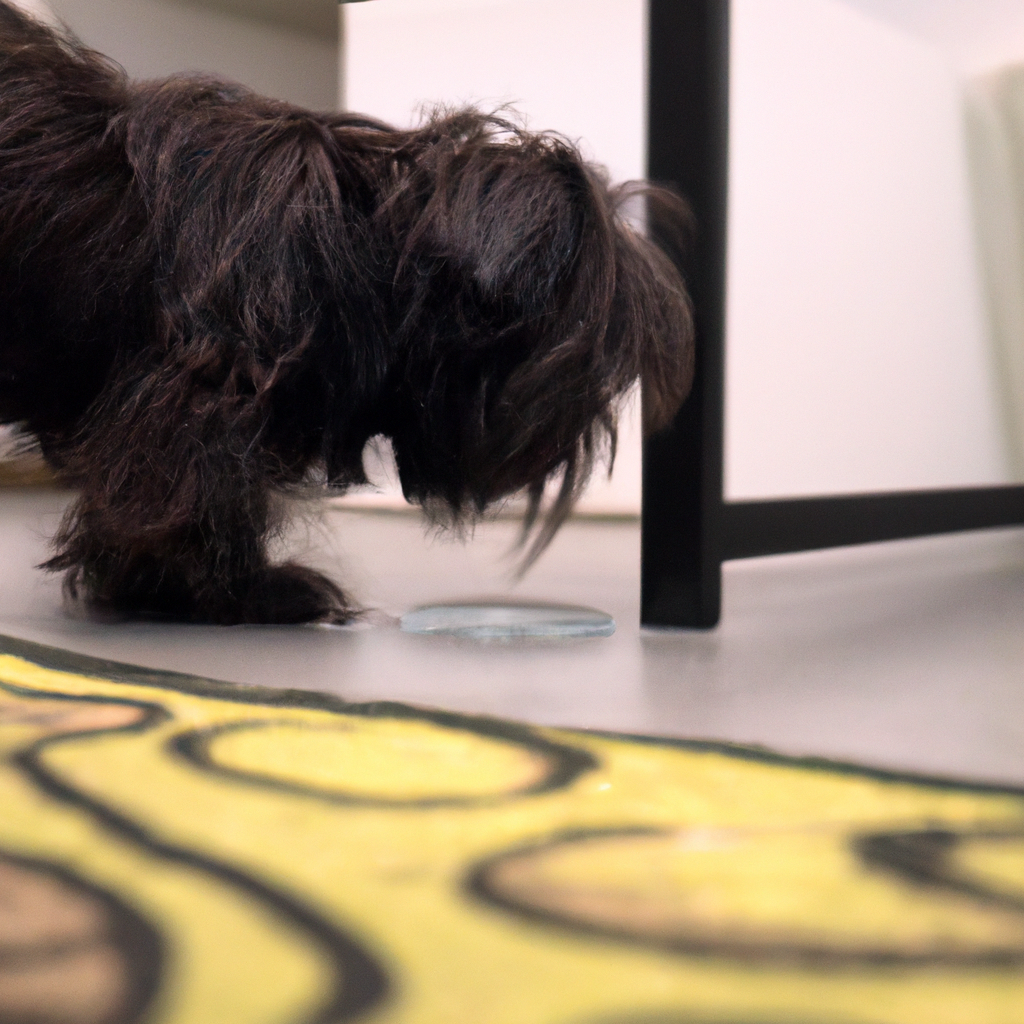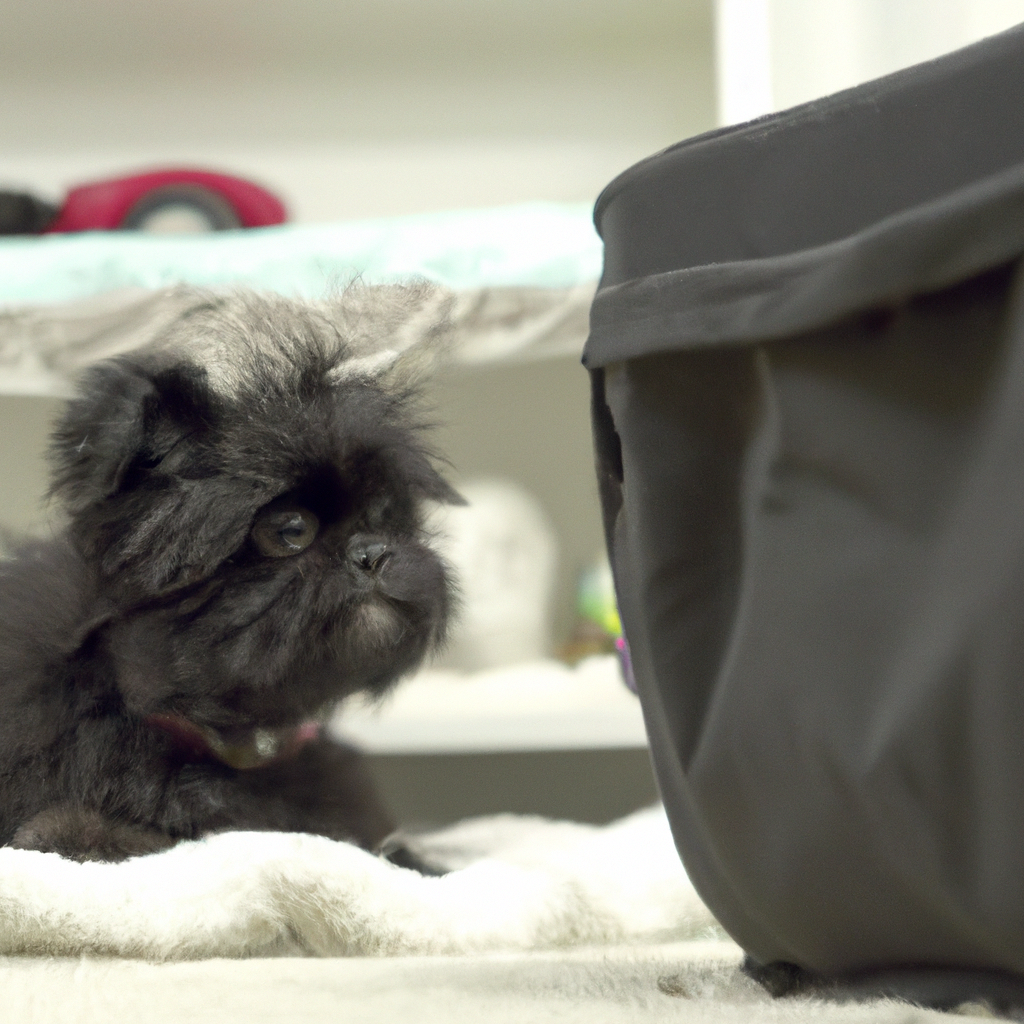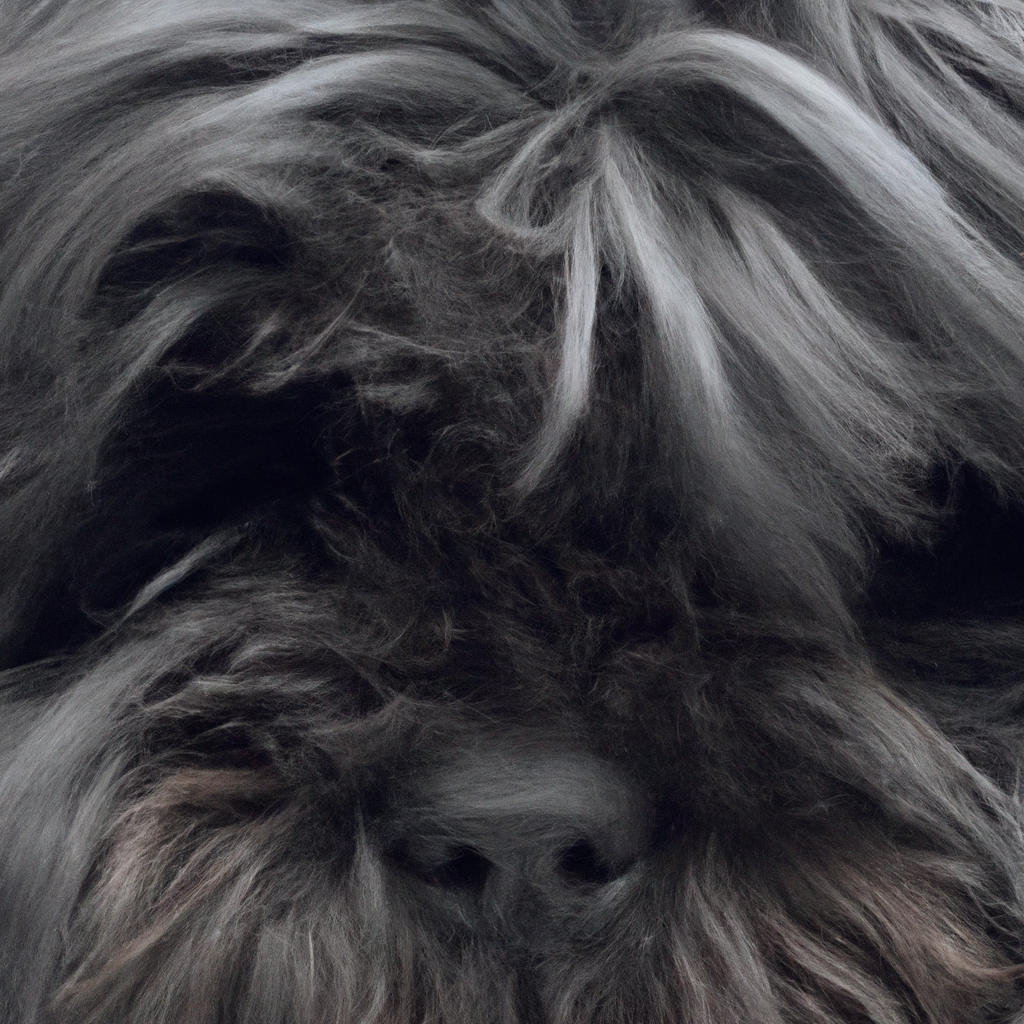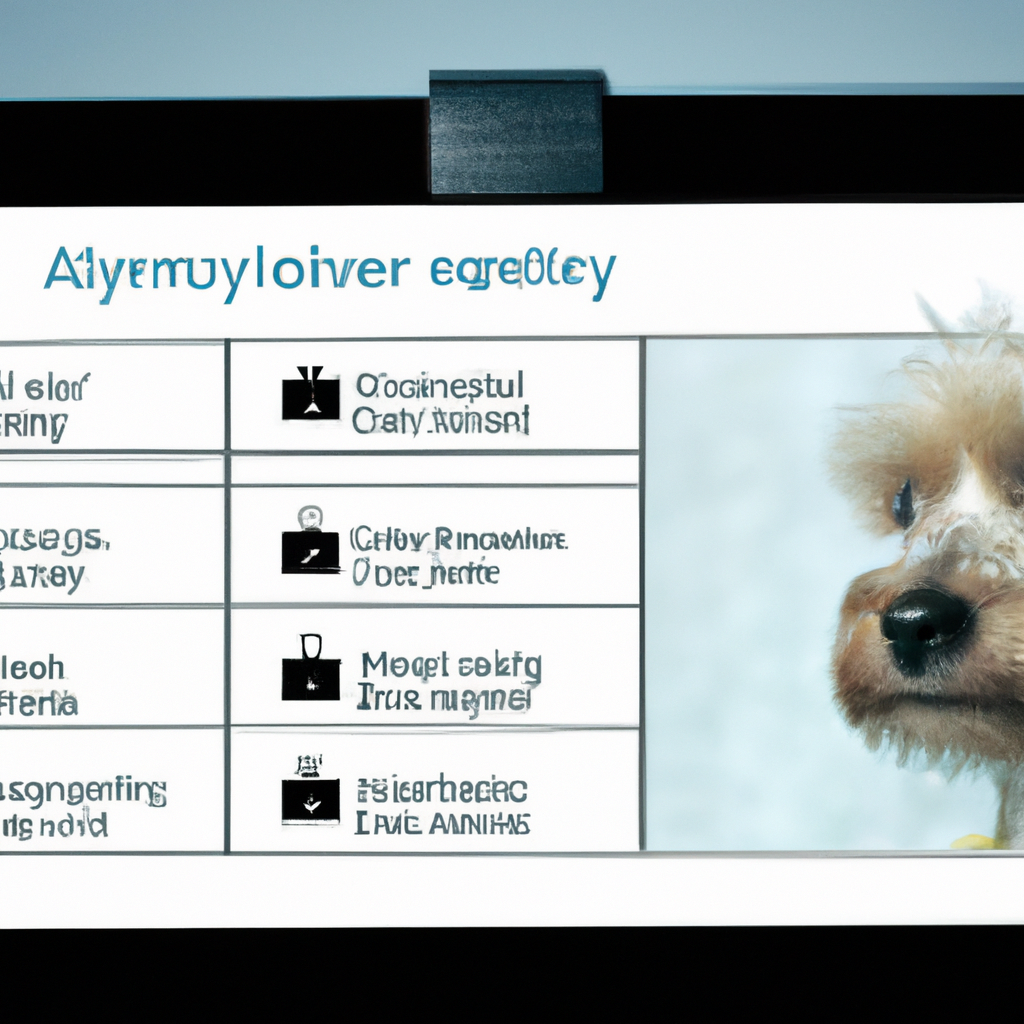Affenpinschers, also known as “Monkey Terriers,” are a small and adventurous breed known for their distinctive appearance and spirited personality. However, like many other breeds, they are prone to certain allergies that can affect their health and quality of life. Caring for Affenpinschers with allergies involves understanding the types of allergies they may encounter, recognizing the symptoms, and providing appropriate treatments. This includes dietary adjustments, environmental changes, and possibly medical interventions. It’s crucial for owners to be knowledgeable and proactive in managing their Affenpinscher’s allergies to ensure their pet’s overall well-being.
Understanding Allergies in Affenpinschers: A Comprehensive Guide
Affenpinschers, affectionately known as “Monkey Dogs,” are a small but sturdy breed known for their distinctive, scruffy appearance and playful, energetic personalities. However, like many other breeds, Affenpinschers can be prone to allergies, which can cause discomfort and health issues if not properly managed. Understanding allergies in Affenpinschers is crucial for any owner who wants to ensure their furry friend lives a happy, healthy life.
Allergies in Affenpinschers, as in other breeds, are essentially an overreaction of the immune system to a substance that it perceives as a threat. These substances, known as allergens, can be anything from certain foods to pollen in the air. When an Affenpinscher with allergies encounters an allergen, their immune system responds by releasing histamines, which can cause a variety of symptoms.
The symptoms of allergies in Affenpinschers can vary widely, but some of the most common include itching, redness, and swelling of the skin, as well as sneezing, coughing, and watery eyes. In some cases, Affenpinschers with allergies may also experience gastrointestinal issues, such as vomiting or diarrhea. If you notice any of these symptoms in your Affenpinscher, it’s important to consult with a veterinarian as soon as possible.
Identifying the cause of your Affenpinscher’s allergies can be a challenging process, as it often involves a process of elimination. Your vet may recommend an elimination diet to determine if your dog is allergic to a specific food. This involves feeding your dog a diet that contains only a few ingredients, then gradually adding in other foods to see which ones trigger an allergic reaction.
Environmental allergies, such as those caused by pollen, dust mites, or mold, can be more difficult to identify and manage. In these cases, your vet may recommend allergy testing, which can help pinpoint the specific allergens that are causing your dog’s symptoms. Once the allergens have been identified, you can take steps to reduce your dog’s exposure to them. This might involve changes to your home environment, such as using air purifiers or hypoallergenic bedding, or it could involve lifestyle changes, such as avoiding walks during peak pollen times.
Treatment for allergies in Affenpinschers often involves a combination of avoidance strategies and medication. Antihistamines can help reduce the symptoms of allergies, while corticosteroids can help control severe or chronic symptoms. In some cases, your vet may recommend immunotherapy, which involves gradually exposing your dog to small amounts of the allergen to help build up their tolerance.
Caring for an Affenpinscher with allergies can be a challenge, but with patience and dedication, it’s entirely possible to manage their symptoms and ensure they live a comfortable, happy life. Remember, every Affenpinscher is unique, and what works for one dog may not work for another. It’s important to work closely with your vet to develop a personalized treatment plan that meets your dog’s specific needs.
In conclusion, understanding allergies in Affenpinschers is crucial for any owner. By recognizing the signs of allergies, identifying potential allergens, and working with a vet to develop an effective treatment plan, you can help your Affenpinscher live a healthier, happier life. After all, our furry friends deserve nothing but the best.
Top 8 Allergy Symptoms in Affenpinschers: What to Look For
Affenpinschers, affectionately known as “Monkey Dogs,” are a small breed known for their playful and adventurous spirit. However, like many other breeds, they can be prone to allergies. Understanding the top eight allergy symptoms in Affenpinschers can help you ensure your furry friend stays healthy and happy.
Firstly, one of the most common symptoms of allergies in Affenpinschers is excessive scratching. If you notice your pet scratching more than usual, it could be a sign of an allergic reaction. This is often due to the irritation caused by allergens on their skin. Similarly, redness and inflammation are also common symptoms. These can occur anywhere on the body but are most often seen on the paws, ears, and belly.
Another symptom to look out for is frequent ear infections. Affenpinschers have floppy ears that can easily trap allergens, leading to infections. If your pet is shaking its head more than usual or scratching its ears, it might be suffering from an ear infection.
In addition to skin and ear issues, gastrointestinal problems can also indicate allergies. If your Affenpinscher has diarrhea, vomiting, or changes in appetite, it could be reacting to something in its diet. Food allergies are common in dogs, and certain ingredients like wheat, soy, and certain proteins can trigger reactions.
The fifth symptom to be aware of is respiratory issues. Just like humans, dogs can also suffer from allergic rhinitis. If your Affenpinscher is sneezing, coughing, or has a runny nose, it could be due to airborne allergens like pollen or dust mites.
Moving on, another symptom that is often overlooked is changes in behavior. If your Affenpinscher seems unusually tired, irritable, or anxious, it could be because they’re feeling unwell due to allergies. It’s always important to pay attention to any changes in your pet’s behavior, as they can often indicate underlying health issues.
The seventh symptom to watch out for is excessive licking or chewing. This is often a sign of skin irritation due to allergies. If left untreated, this can lead to hot spots or sores, which can be very painful for your pet.
Lastly, if your Affenpinscher has swollen or watery eyes, it could be suffering from allergies. This is often caused by airborne allergens and can be very uncomfortable for your pet.
In conclusion, if you notice any of these symptoms in your Affenpinscher, it’s important to consult with a vet as soon as possible. They can help identify the cause of the allergies and recommend appropriate treatment. Remember, early detection and treatment can make a big difference in your pet’s comfort and health. So, keep a close eye on your Affenpinscher and ensure they get the care they need to live a happy, allergy-free life.
Effective Allergy Treatments for Affenpinschers
Affenpinschers, affectionately known as “Monkey Dogs,” are a small breed of dog known for their playful and adventurous spirit. However, like many other breeds, Affenpinschers can be prone to allergies, which can cause discomfort and distress if not properly managed. Understanding the types of allergies that can affect your Affenpinscher and the effective treatments available can help ensure your furry friend lives a happy, healthy life.
Allergies in Affenpinschers can be triggered by a variety of factors, including food, environmental allergens like pollen or dust mites, and even certain materials like plastic or rubber. Symptoms can range from mild to severe and may include itching, redness, swelling, and digestive issues. If you notice any of these signs, it’s important to consult with your vet to determine the cause and develop an appropriate treatment plan.
One of the most common treatments for allergies in Affenpinschers is antihistamines. These medications work by blocking the histamine that your dog’s body produces in response to an allergen, thereby reducing symptoms. Antihistamines can be administered orally or topically, depending on the type and severity of your dog’s allergies. However, it’s important to note that not all antihistamines are safe for dogs, so always consult with your vet before starting any new medication.
In addition to antihistamines, your vet may recommend corticosteroids for severe allergies. These powerful anti-inflammatory drugs can help reduce swelling and itching, providing relief for your Affenpinscher. However, due to potential side effects, corticosteroids are typically used as a short-term treatment and should be used under the supervision of a vet.
For food allergies, the most effective treatment is often a change in diet. This may involve switching to a hypoallergenic dog food or implementing an elimination diet to identify the specific food causing the allergic reaction. Once the offending food is identified, it can be removed from your dog’s diet to prevent future reactions.
Environmental allergies can be a bit trickier to manage, as it’s not always possible to completely avoid exposure to allergens like pollen or dust mites. However, there are steps you can take to reduce your Affenpinscher’s exposure. Regular cleaning of your home, especially your dog’s bedding and toys, can help reduce allergen levels. Using air purifiers and keeping windows closed during high pollen times can also help.
In some cases, your vet may recommend allergy shots, also known as immunotherapy. This treatment involves gradually exposing your dog to small amounts of the allergen, with the goal of desensitizing their immune system. While this treatment can be effective, it’s typically reserved for severe allergies that haven’t responded to other treatments.
In conclusion, while allergies can be a common issue for Affenpinschers, there are a variety of effective treatments available. By working closely with your vet, you can develop a treatment plan that helps manage your dog’s symptoms and improves their quality of life. Remember, every Affenpinscher is unique, and what works for one may not work for another. Patience and persistence are key in finding the right solution for your furry friend.
Preventing Allergies in Affenpinschers: Tips and Tricks

Affenpinschers, affectionately known as “Monkey Dogs,” are a small but sturdy breed known for their distinctive, scruffy appearance and playful, energetic personalities. However, like many other breeds, Affenpinschers can be prone to allergies, which can cause discomfort and health issues if not properly managed. As a loving Affenpinscher owner, it’s essential to understand how to prevent and manage these allergies to ensure your furry friend stays happy and healthy.
Allergies in Affenpinschers can be triggered by a variety of factors, including certain foods, environmental elements like dust or pollen, and even specific materials found in toys or bedding. The first step in preventing allergies in your Affenpinscher is to identify potential allergens. This can be done through allergy testing at your vet, or by closely monitoring your dog’s reactions to new foods or environments.
Once you’ve identified potential allergens, the next step is avoidance. If your Affenpinscher is allergic to a specific food, for example, you’ll need to ensure that it’s completely eliminated from their diet. This may require careful reading of pet food labels, as many commercial dog foods contain a mix of different proteins and grains. If your dog is allergic to a certain type of fabric, you’ll need to ensure their bedding, toys, and any clothing are made of hypoallergenic materials.
In addition to avoidance, there are several other strategies you can employ to help prevent allergies in your Affenpinscher. Regular grooming can help reduce allergens that may be trapped in your dog’s coat. This includes frequent brushing and bathing with hypoallergenic shampoos. Regular cleaning of your home, particularly areas where your dog spends a lot of time, can also help reduce exposure to environmental allergens.
Another important aspect of allergy prevention is boosting your Affenpinscher’s overall health and immune system. A healthy dog is better equipped to handle allergens and less likely to develop allergies. This includes feeding them a balanced, nutritious diet, ensuring they get plenty of exercises, and keeping up with regular vet check-ups and vaccinations.
If, despite your best efforts, your Affenpinscher still develops allergy symptoms, it’s important to seek veterinary care as soon as possible. Symptoms can include itching, redness, swelling, digestive issues, and respiratory problems. Your vet can provide treatments such as antihistamines, steroids, or allergy shots to help manage these symptoms.
In some cases, your vet may recommend a hypoallergenic diet. These diets are specially formulated to exclude common allergens and can be a good option for dogs with food allergies. However, they should only be used under the guidance of a vet, as they may not provide all the necessary nutrients for your dog’s overall health.
In conclusion, while allergies can be a common issue for Affenpinschers, with careful management and prevention strategies, they don’t have to impact your dog’s quality of life. By identifying potential allergens, avoiding them where possible, keeping your dog and their environment clean, and ensuring they’re in overall good health, you can help prevent allergies in your Affenpinscher. And remember, if your dog does show signs of allergies, prompt veterinary care is essential to manage symptoms and ensure their comfort and well-being.
Dietary Adjustments for Affenpinschers with Food Allergies
Affenpinschers, affectionately known as “Monkey Dogs,” are a small but sturdy breed known for their playful and adventurous nature. However, like many other breeds, Affenpinschers can be prone to certain health issues, including food allergies. If your Affenpinscher is suffering from food allergies, it’s essential to understand how to care for them properly, and this often involves making dietary adjustments.
Food allergies in Affenpinschers can manifest in various ways, including skin irritations, gastrointestinal issues, and even behavioral changes. If you notice your furry friend scratching excessively, experiencing frequent bouts of diarrhea, or acting unusually lethargic, it might be time to consider the possibility of a food allergy. Of course, it’s always best to consult with a veterinarian to confirm the diagnosis and discuss the best course of action.
Once a food allergy is confirmed, the next step is to identify the allergen. This process can be a bit tricky, as it involves an elimination diet. Essentially, you’ll need to remove all potential allergens from your Affenpinscher’s diet and then gradually reintroduce them one by one. This method allows you to monitor your pet’s reaction to each food item and identify which one is causing the allergic reaction.
Common allergens for Affenpinschers include beef, chicken, dairy, wheat, and soy. However, every dog is unique, and what triggers an allergic reaction in one Affenpinscher might not affect another. Therefore, it’s crucial to be patient and thorough during the elimination diet process.
Once the allergen is identified, the next step is to adjust your Affenpinscher’s diet accordingly. This means eliminating the offending food item completely. It’s important to read the labels on any commercial dog food you purchase, as many contain a mix of different proteins and grains. If your Affenpinscher is allergic to a common ingredient like chicken or wheat, you might need to switch to a specialized hypoallergenic dog food.
In addition to avoiding the allergen, it’s also beneficial to include foods in your Affenpinscher’s diet that can boost their immune system and promote gut health. Probiotics, for instance, can help maintain a healthy balance of bacteria in your dog’s gut, which can reduce allergic reactions. Omega-3 fatty acids, found in fish and flaxseeds, can also help reduce inflammation and improve skin health.
It’s also worth noting that hydration plays a crucial role in managing food allergies. Ensure your Affenpinscher has constant access to fresh, clean water. Dehydration can exacerbate allergy symptoms and make your pet feel even more uncomfortable.
Caring for an Affenpinscher with food allergies might seem daunting at first, but with patience and careful management, it’s entirely possible to help your pet live a happy, healthy life. Remember, the key is to work closely with your vet, be diligent about your pet’s diet, and monitor their health regularly. With these steps, you can ensure your Affenpinscher gets the care they need and deserves.
How to Manage Seasonal Allergies in Affenpinschers
Affenpinschers, affectionately known as “Monkey Dogs,” are a small but sturdy breed known for their distinctive, scruffy appearance and playful, energetic personalities. However, like many other breeds, Affenpinschers can be prone to allergies, particularly seasonal ones. As a pet parent, it’s essential to understand how to manage these allergies to ensure your furry friend remains comfortable and healthy throughout the year.
Seasonal allergies in Affenpinschers can manifest in various ways, including skin irritation, excessive scratching, sneezing, watery eyes, and even digestive issues. These symptoms often arise due to environmental allergens such as pollen, dust mites, mold spores, and certain types of grass or plants. As the seasons change, so too does the prevalence of these allergens, which can lead to flare-ups in your Affenpinscher’s allergies.
The first step in managing your Affenpinscher’s seasonal allergies is to identify the triggers. This can be a bit of a detective game, as it involves observing your pet’s reactions to different environments and seasons. If you notice your Affenpinscher scratching more during spring, for example, they might be allergic to a type of pollen common in that season. Once you’ve identified potential triggers, it’s advisable to consult with a vet. They can perform tests to confirm the allergens and provide professional advice on managing the allergies.
One common method of managing seasonal allergies in Affenpinschers is through medication. Antihistamines, for instance, can help to reduce the body’s allergic response and alleviate symptoms. Steroids may also be prescribed in more severe cases to control inflammation. However, it’s crucial to remember that medication should always be administered under the guidance of a vet, as improper use can lead to side effects.
In addition to medication, there are several lifestyle changes that can help manage your Affenpinscher’s allergies. Regular grooming, for example, can help to remove allergens from your pet’s coat and skin, reducing their exposure. Using hypoallergenic shampoos and conditioners during bath time can also soothe irritated skin and prevent further inflammation.
Diet can also play a significant role in managing allergies. Some Affenpinschers may have food allergies that exacerbate their seasonal allergies. In such cases, a hypoallergenic diet can help to reduce symptoms. Even if your Affenpinscher doesn’t have food allergies, a balanced diet rich in omega-3 fatty acids can help to boost their immune system and improve their overall skin health, making them more resilient to allergens.
Lastly, try to limit your Affenpinscher’s exposure to allergens as much as possible. This might mean keeping windows closed during high pollen seasons or avoiding walks in certain areas known to trigger your pet’s allergies.
In conclusion, managing seasonal allergies in Affenpinschers involves a combination of identifying triggers, consulting with a vet, medication, lifestyle changes, and reducing exposure to allergens. It might seem like a lot of work, but remember, it’s all part of ensuring your Affenpinscher lives a comfortable, happy life. After all, they’re not just pets; they’re part of the family.
The Role of Regular Vet Check-ups in Detecting Allergies in Affenpinschers
Affenpinschers, affectionately known as “Monkey Dogs,” are a small but sturdy breed known for their distinctive, scruffy appearance and playful, energetic personalities. However, like many purebred dogs, Affenpinschers can be prone to certain health issues, including allergies. Regular vet check-ups play a crucial role in detecting and managing allergies in Affenpinschers, ensuring they live a comfortable and healthy life.
Allergies in Affenpinschers can manifest in various ways, including skin irritation, digestive issues, and respiratory problems. These symptoms can be triggered by a range of allergens, from certain foods and plants to dust mites and mold spores. Regular vet check-ups are essential in identifying these allergies early on, as they allow for a thorough examination and the opportunity to discuss any changes or concerns you may have noticed in your pet’s behavior or physical condition.
During a routine check-up, your vet will likely conduct a physical examination of your Affenpinscher, checking for signs of skin irritation, ear infections, or other common allergy symptoms. They may also ask about your dog’s diet, environment, and behavior to identify potential allergens. If allergies are suspected, further tests such as blood tests or skin tests may be recommended to pinpoint the exact cause.
Early detection of allergies in Affenpinschers is crucial, as untreated allergies can lead to more serious health issues over time. For instance, continuous scratching due to skin irritation can result in open sores and secondary infections. Similarly, digestive issues caused by food allergies can lead to malnutrition if not addressed promptly. Regular vet check-ups can help prevent these complications by ensuring that allergies are identified and managed as soon as possible.
Once an allergy has been diagnosed, your vet will work with you to develop a treatment plan tailored to your Affenpinscher’s specific needs. This may involve changes to your dog’s diet or environment, medication to manage symptoms, or in some cases, desensitization therapy to reduce your dog’s reaction to certain allergens. Regular follow-up appointments will also be important to monitor your dog’s response to treatment and make any necessary adjustments.
In addition to regular vet check-ups, there are also steps you can take at home to help manage your Affenpinscher’s allergies. Regular grooming can help remove allergens from your dog’s coat and skin, while a balanced, hypoallergenic diet can help prevent food allergies. Keeping your home clean and free of dust and other potential allergens can also make a big difference.
In conclusion, regular vet check-ups play a vital role in detecting and managing allergies in Affenpinschers. They provide an opportunity for early detection and treatment, helping to prevent more serious health issues down the line. By working closely with your vet and taking steps to manage allergens at home, you can help ensure that your Affenpinscher lives a comfortable, happy, and healthy life, despite any allergies they may have. After all, our furry friends deserve nothing but the best care and love we can provide.
Creating a Comfortable Environment for Affenpinschers with Allergies
Affenpinschers, affectionately known as “Monkey Dogs,” are a small but sturdy breed known for their distinctive, scruffy appearance and playful, energetic personalities. However, like many other breeds, Affenpinschers can be prone to allergies, which can cause discomfort and distress for these little dogs. As a pet parent, it’s essential to understand how to create a comfortable environment for your Affenpinscher if they suffer from allergies.
Allergies in Affenpinschers can manifest in various ways, including skin irritation, digestive issues, and respiratory problems. These symptoms can be triggered by a range of factors, such as certain foods, environmental allergens like pollen or dust mites, or even specific materials found in pet toys or bedding. Therefore, creating a comfortable environment for an Affenpinscher with allergies often involves identifying and eliminating these triggers.
One of the first steps in caring for an Affenpinscher with allergies is to identify what’s causing the allergic reaction. This process can involve a bit of detective work and may require the help of a veterinarian. They can conduct tests to pinpoint the allergen and provide advice on how to manage the allergy. Once the allergen is identified, it’s crucial to remove it from your dog’s environment as much as possible.
For instance, if your Affenpinscher is allergic to a particular food, you’ll need to adjust their diet accordingly. This might mean switching to a hypoallergenic dog food or preparing homemade meals with ingredients that won’t trigger an allergic reaction. If environmental allergens are the problem, regular cleaning of your home, especially the areas where your dog spends most of their time, can help reduce their exposure. Using air purifiers and keeping windows closed during high pollen seasons can also be beneficial.
If your Affenpinscher is allergic to certain materials, you’ll need to be mindful of the toys, bedding, and even clothing you choose for them. Opt for hypoallergenic materials and avoid those known to cause allergic reactions. Regularly washing these items can also help to remove any allergens that may have settled on them.
In addition to these steps, there are other ways to make your Affenpinscher more comfortable. Regular grooming can help to remove allergens from their coat and skin, reducing irritation. However, be sure to use hypoallergenic, fragrance-free shampoos and conditioners, as some grooming products can exacerbate allergies.
Medication may also be necessary to manage your Affenpinscher’s allergies. Antihistamines can help to reduce allergic reactions, while topical creams and ointments can soothe irritated skin. Always consult with your vet before starting any new medication regimen.
Creating a comfortable environment for an Affenpinscher with allergies requires patience and diligence. It’s about more than just removing allergens; it’s about creating a lifestyle that minimizes their exposure to potential triggers. With careful management and a little bit of detective work, you can help your Affenpinscher live a happy, comfortable life, despite their allergies. Remember, every Affenpinscher is unique, and what works for one may not work for another. Always consult with a vet to develop a personalized care plan for your furry friend.In conclusion, caring for Affenpinschers with allergies requires a dedicated and attentive approach. It involves identifying the allergens, providing a suitable diet, ensuring a clean environment, and regular vet check-ups. Medications or allergy shots may be necessary depending on the severity of the allergies. It’s crucial to monitor the dog’s behavior and physical condition closely for any signs of discomfort or allergic reactions. With proper care and management, Affenpinschers with allergies can lead a comfortable and healthy life.





